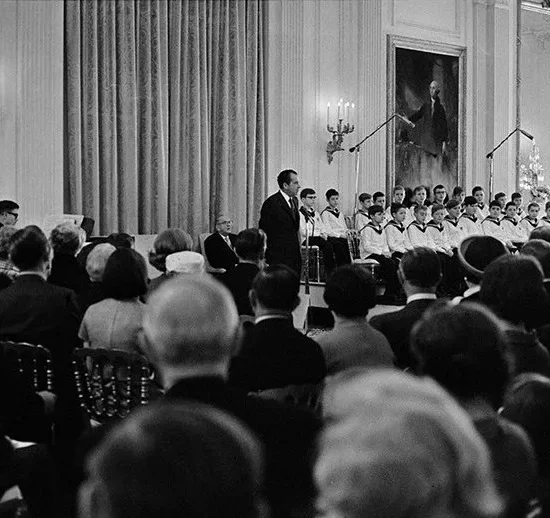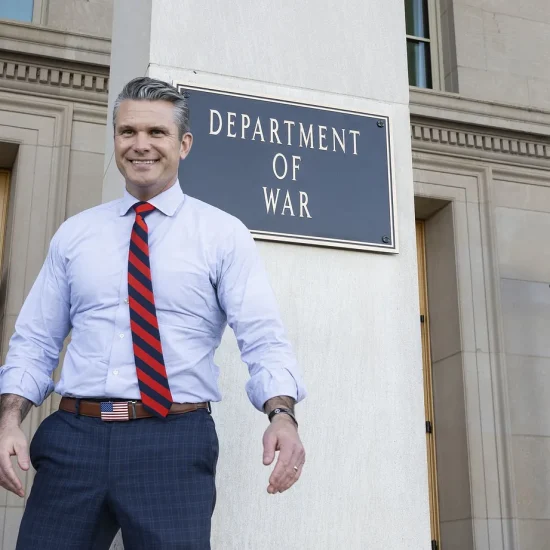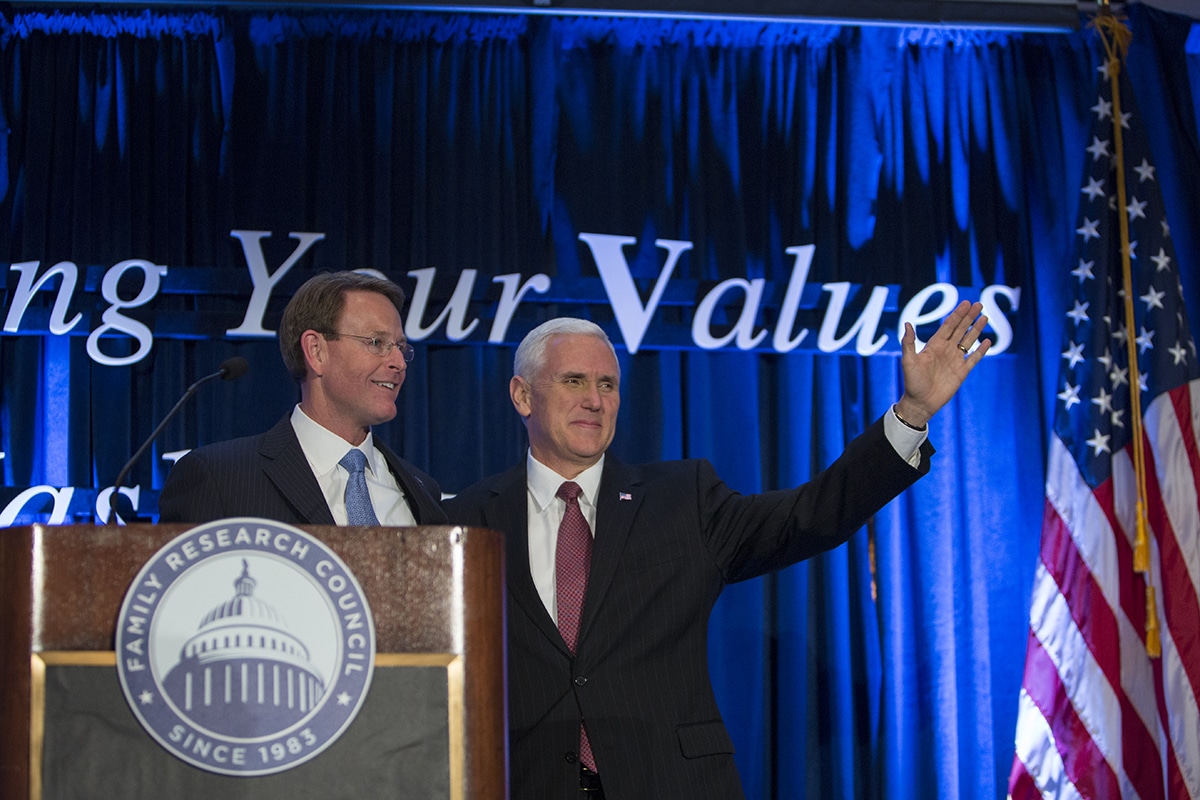
In the Family Research Council’s 2019 fiscal year, Tony Perkins received over $300,000 for his work leading the conservative Christian advocacy organization and its related entities.
That may sound like a high number in a society where the median man working full time earned just over $60,000 (and the median woman received nearly $10,000 less). But in the rarified air of Washington, D.C., that amount is relatively modest. After all, the president of the Heritage Foundation, another conservative advocacy organization, made nearly a million dollars that same year.
However, Perkins’s salary looks like a princely sum compared to conservative pastors. According to a 2018 compensation study, the average salary of a senior pastor in the Southern Baptist Convention was just over $65,000. Meanwhile, a different survey found that half of evangelical senior pastors received less than $50,000.
So, it turns out that Perkins — who is an ordained Southern Baptist minister and a member of the steering committee of the Conservative Baptist Network that thinks the SBC is too liberal — might be due for a pay cut. That’s because yesterday (July 11), Andrea Suozzo of ProPublica reported the FRC applied for reclassification as an “association of churches” with the IRS, which granted the group’s request in 2020.
As Suozzo noted, the FRC does not describe itself as a church on its website, leaves basic religious tasks (like weddings, baptisms, and teaching) up to “partner churches,” told the IRS it regularly holds chapel services but informed the reporter they don’t hold services, and “does not have members but a congregation made up of its board of directors, employees, supporters, and partner churches.” All this makes Rev. Perkins the senior pastor of a rather unique flock.
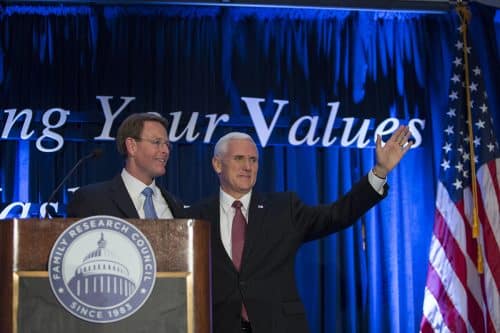
Tony Perkins (left) with then-Vice President Mike Pence at a Family Research Council event in Washington, D.C., on April 7, 2017. (Paul D. Williams/Public Domain)
The move does not reflect a change in the FRC’s mission or identity. Rather, it appears cynically designed to reduce reporting requirements around donor activities, financial transactions, and, of course, staff salaries. How much will Perkins make this year? The FRC, as a church, won’t have to report that figure.
All this means the public will gain fewer insights into the undertakings of an organization designated a hate group by the Southern Poverty Law Center, whose string of past controversies include installing as head of its lobbying arm Josh Duggar (a reality TV star who later confessed to molesting children as a teenager and was convicted of possessing child pornography), and that is guided by a leader (Perkins) who advocated for the overthrow of a free and fair election in 2020.
With a long history of antagonism towards the IRS, the attempt by the FRC to minimize its reporting obligations and avoid government and public scrutiny comes as no surprise. However, the FRC’s maneuver is not an isolated case but part of a worrisome trend with serious, negative consequences for both American democracy and the witness of real U.S. churches.
In this edition of A Public Witness, we audit the conservative evangelical organizations now claiming the banner of “church” for tax purposes. Then we discuss their ulterior motives for this shift and the damage it inflicts on our democracy. Finally, we argue this tax scam harms the Christian witness as it undermines core theology about what it means to be a church.
Jumping on the Bandwagon
Those who give to Samaritan’s Purse after a natural disaster or crisis presumably believe their donation will help those in need. If so, they’d be surprised to learn that instead of disbursing its resources, the charity stockpiled nearly half a billion dollars in cash and equivalents on its balance sheet. They might also be surprised to learn that Samaritan’s Purse paid Franklin Graham nearly $700,000 for his work as the organization’s president and CEO.
While an eye-popping salary amount, that number does not reflect all of Graham’s compensation. Despite Samaritan’s Purse’s financial filings listing Graham as a full-time employee, he also serves as the president and CEO of the Billy Graham Evangelistic Association. His compensation between the two organizations attracted negative attention for nearing $900,000 (or what we colloquially refer to as “Three Tony Perkins”).
Calling that salary level “eyebrow-raising,” Grant Wacker, an emeritus historian at Duke and noted Billy Graham scholar, told Religion News Service in 2015 that such compensation “is on the generous side for anyone who is asking for other people’s money” (and we find that critique on the generous side).
Graham’s current salary isn’t publicly available because the BGEA sought reclassification as a “church” in 2016 after receiving the unwanted publicity. At the time, the organization claimed the salary controversy did not inspire the change and pledged to continue publicly disclosing Graham’s compensation — a commitment it has failed to honor.
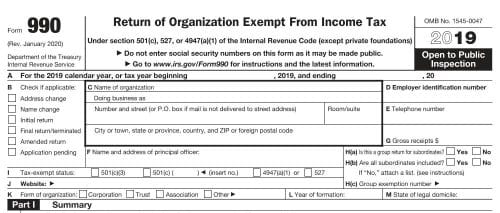
Joining the BGEA and the FRC in the club of evangelical parachurch organizations presenting themselves as churches to the government are a host of other familiar names. Focus on the Family made the switch in 2016, citing issues of donor privacy (to their credit, they do self-publish a 990 with donor information redacted). The American Family Association and its related American Family Radio network made the change this year. Other “churches” on the list include Cru, Navigators, and Gideons International. Apparently, a churchplanting revival has broken out in recent years!
The transparency concerns raised by this financial sleight of hand are more than hypothetical. In 2007, U.S. Sen. Chuck Grassley, a Republican from Iowa, launched high-profile investigations into six ministries — including that of prosperity gospel preacher and future Donald Trump faith advisor Paula White — over possible misuses of financial resources that would represent violations of their IRS tax exempt status.
Other conservative evangelical organizations pushed back on Grassley’s efforts and many of the ministries refused to cooperate with the investigation. Ultimately, the final report Grassley issued did not formally allege wrongdoing but did note significant questions related to the organizations’ spending patterns and financial oversight processes. The senator also expressed a desire for reforming the tax code to prevent future abuses. That work remains unfinished.
Help sustain the ministry of Word&Way by subscribing to A Public Witness!
Dark Money Politics
Gaining less financial transparency isn’t the only temptation for an organization like the Family Research Council to convert to a church. It also adds to the protection of its tax-exempt status if it engages in partisan politics (which, despite professions of nonpartisanship, is basically the whole point of the FRC’s existence).
Partisan activities by 501(c)(3) tax-exempt nonprofit organizations are prohibited through what is called the “political campaign activity ban.” You might recognize the rule from its informal nickname: the “Johnson Amendment.” That reference is to then-Sen. Lyndon Johnson who proposed it in 1954. Some conservatives use the moniker to paint it as a liberal policy even though it was passed without controversy by a Republican House and Senate and then signed into law by Republican President Dwight D. Eisenhower. It was later strengthened in 1987 by a Democratic House, Republican Senate, and Republican President Ronald Reagan.
As efforts by the FRC and others attempted to undo this tax code provision, coalitions of clergy, nonprofits, and others have repeatedly stepped up to convince Congress to keep the rule in place. The provision prevents political campaigns from utilizing tax-exempt resources to win elections, and helps protect the sanctity of nonprofits.
President Donald Trump promised in 2017 to “totally destroy the Johnson Amendment.” Despite falsely bragging about ending the prohibition, an executive order he signed only instructed the IRS not to enforce it. But the issue was an important one for him and his evangelical base. As investigative journalist Sarah Posner explained in her book Unholy on the alliances between Trump and White evangelical leaders like the FRC’s Perkins, Trump’s campaign promise to eliminate the political campaign activity ban won him praise from key conservative evangelical leaders as they backed his candidacy.
“If it were repealed, evangelical celebrities would be further emboldened to use their perches for endorsements and even fundraising, mightily strengthening their political hand,” Posner explained. “The merger of church and state that the Christian right has favored since arising as a force in Republican politics would be one crucial step closer to reality.”
But even with the rule still on the books, churches continue to blatantly disregard the law as they feature candidates in the pulpit and even play campaign ads during worship services. And they can generally do so without fear since the IRS already rarely even looks into violations of the political campaign activity ban. Especially when the lawbreaker is a church.

While the FRC already fell under the political campaign activity ban as a 501(c)(3), churches receive even less scrutiny from the IRS than other nonprofits — and the fact that the FRC’s application to be designated a church was approved by the IRS should prove how little probing the IRS currently gives to problematic behaviors by churches.
“Without the public disclosure that non-church nonprofits have to provide via their tax returns, nonprofits classified as churches will be able to raise/spend money without any real oversight. And with no enforcement of Johnson Amendment, that means politics,” explained Posner after news of the FRC’s new churchly status. “They want churches to be more involved in politics.”
And why do churches receive less scrutiny than other nonprofits? Because a church sued the IRS.
In 2006, Citizens for Responsibility and Ethics in Washington filed an IRS complaint against Living Word Christian Center in Brooklyn Park, Minnesota, alleging it broke the law by endorsing Michele Bachmann’s candidacy for the U.S. House of Representatives. The watchdog group followed with a second complaint the next year claiming the pastor had enriched himself through illegal transactions. So, the IRS opened an investigation. The church not only refused to cooperate but also sued to challenge the inquiry.
In 2009, a federal judge ruled for the church, arguing the IRS hadn’t used someone high enough up to authorize the inquiry. For audits of churches (but not other nonprofits), the IRS must first have a regional commissioner (or higher) approve the investigation. The IRS had eliminated that regional position in the 1990s, with the workload falling on lower-level agents.
That makes opening audits of churches much more difficult today than it is for other nonprofits. And given the understaffed status of the agency and attacks from conservatives during the Obama administration claiming Tea Party groups had been targeted (claims that turned out to be overhyped), the IRS likely isn’t investing much time and energy overcoming the regulatory barriers and political pushback required to police the partisan transgressions of churches.
Thus, a nonprofit like the FRC that engages in forbidden partisan politicking can gain more protection for their tax-exempt status and all its benefits if they rebaptize themselves as a church. This creates another set of perverse incentives, effectively encouraging “churches” to use their protected status and lack of transparency to aid political campaigns.
Whether the excess of televangelists, the exorbitant pay doled out to Franklin Graham, or politicized religious groups like the FRC, this church loophole in the tax code harms our civic life by taking protections afforded to houses of worship and allows them to be exploited by dens of thieves.
Get cutting-edge reporting and analysis like this in your inbox every week by subscribing today!
What’s in a Name?
As nonprofits like the Family Research Council, Samaritan’s Purse, and the American Family Association are reborn as churches, this move might allow them to take advantage of IRS rules for their benefit but proves quite costly to another group: actual churches.
There’s a familiar pattern that repeats itself in American public life and shows up on our social media feeds. An individual church or Christian ministry behaves badly and provokes a knee-jerk response from more secular-minded people to demand the revocation of tax exempt status for all churches. Beto O’Rourke’s outrage in 2019 at religious groups opposing same-sex marriage serves as a prominent example.
Such responses demonstrate how trust in the work and witness of congregations is undermined by unrelated actors marching under the church banner. With public confidence in churches near all time lows, the reclassification of these parachurch and political organizations as churches risks further damage to the reputation of actual Christian communities. That’s why Christian ethicist David Gushee, author of Introducing Christian Ethics (and a Word&Way board member), believes the trend that the FRC joined is a problem.
“These days, it appears that some churches essentially have become political lobbying organizations, while some lobbying organizations — like the FRC — are declaring themselves to be churches, mainly to avoid financial transparency,” Gushee told us. “Both on the church side and the state side, we need to be able to tell the difference between a church and a political advocacy group. I call on actors on both sides to clean this up immediately.”
Beyond that practical problem, there’s also a biblical issue here. Scripture offers us a particular understanding of church that is constituted by distinctive practices that characterized the first Christian communities.
“In early Christian origins, the ecclesia gathered around a multi-hour event that was focused on a meal that fed everyone from rich to poor,” Angela Parker, assistant professor of New Testament and Greek at Mercer University’s McAfee School of Theology, told us.
“Coincidently, Paul’s language in 1 Corinthians calls out members of the ecclesia who eat all of the food before enslaved members arrive from their working duties,” added Parker, author of If God Still Breathes, Why Can’t I?: Black Lives Matter and Biblical Authority. “As concepts of ecclesia/church grew and evolved, we have lost the idea of local ecclesia eating together, talking about Jesus, and enjoying one another’s company. Calling yourself a church when you do none of these is problematic.”

It turns out the church potluck practiced by many local congregations is more biblical than many realize, but the attempts to curry political influence, gain worldly power, or overthrow democracy are outside the bounds of the ecclesia. Those wanting to define church in that way, even just for tax purposes, miss the whole point.
As Dietrich Bonhoeffer eloquently wrote in Life Together, “In the period between the death of Christ and the day of judgment, when Christians are allowed to live here in visible community with other Christians, we have merely a gracious anticipation of the end time. It is by God’s grace that a congregation is permitted to gather visibly around God’s word and sacrament in this world.”
Politics and public policy are undoubtedly important, but we shouldn’t conflate what happens on Capitol Hill with the reign of God. One is properly called church and the other should never go by that name. It turns out that a nonprofit by any other name does not smell as sweet.
As a public witness
Brian Kaylor & Beau Underwood


